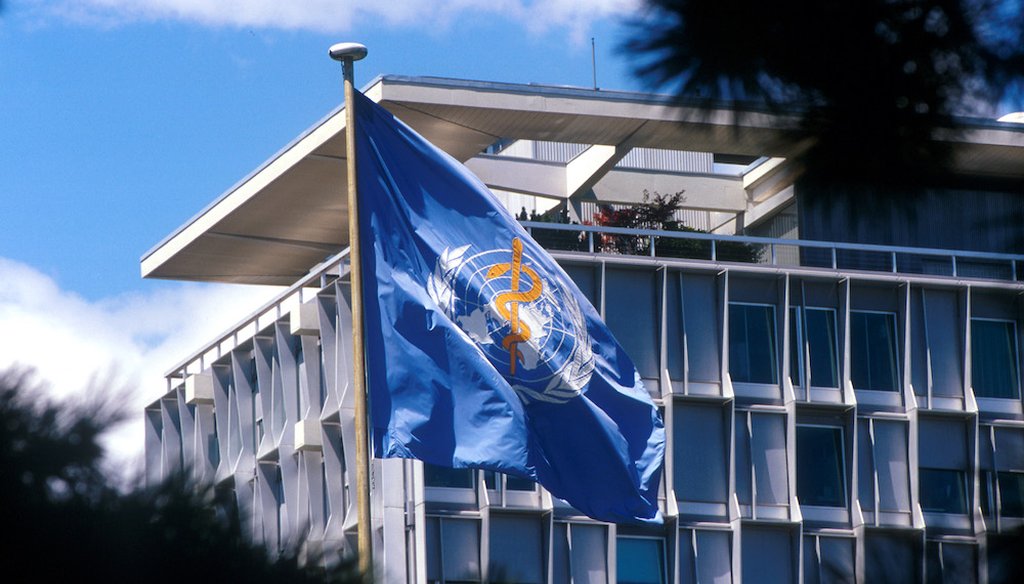

Our only agenda is to publish the truth so you can be an informed participant in democracy.
We need your help.


World Health Organization headquarters in Geneva. (WHO)
Speaking on the "Fox Across America" radio show, U.S. Rep. Brian Fitzpatrick accused global health officials of failing earlier this year to warn the world about the coming coronavirus pandemic.
"For the World Health Organization, the international entity whose sole responsibility it is to alert the world of global pandemics, to miss this, is a huge problem," Fitzpatrick, a Republican, told radio host Jimmy Failla.
We wondered whether Fitzpatrick’s stinging criticism was fair and what exactly the WHO told the public about the coronavirus in the pandemic’s earliest days.
Fitzpatrick was referring to a Jan. 14 tweet from the WHO, which stated that "preliminary investigations conducted by the Chinese authorities have found no clear evidence of human-to-human transmission of the novel #coronavirus (2019-nCoV) identified in #Wuhan, #China."
A timeline of events on the WHO’s website about its actions on Jan. 14 offers a different account of what the organization told the public that day, indicating deeper concern than what was reflected in the tweet.
The timeline states that on that date, a WHO official noted in a press briefing that there "may have been" limited human-to-human transmission of the coronavirus between family members and that there was "a risk of a possible outbreak."
Nearly a week later, according to the timeline, WHO investigators visited Wuhan, the Chinese city where the virus originated, and learned that there was evidence of human-to-human transmission, a major development that contradicted the Chinese government claims cited in the organization’s Jan. 14 tweet.
Another week after that, the WHO’s director-general declared the novel coronavirus outbreak a "public health emergency of international concern," a rare designation meant to convey the extraordinary and serious nature of an unfolding health crisis.
On March 11, the WHO gave the coronavirus another ominous designation – global pandemic.
Will Kiley, a spokesman for Fitzpatrick, said the two-month delay between the Jan. 14 tweet and the pandemic declaration justifies the congressman’s criticism, especially given evidence the virus had spread beyond China as early as Jan. 20.
The Jan. 14 tweet accurately reflects what Chinese officials told the WHO at the time – that there was no evidence of human-to-human transmission. But the group should have questioned the accuracy of China’s claim before issuing the tweet, said Amesh Adalja, a senior scholar at the Johns Hopkins Center for Health Security. He and other infectious-disease experts did.
"We didn’t believe them," Adalja said. "It was clear to many who looked at the data that this virus wasn’t containable."
A PolitiFact story on the WHO’s response to the pandemic written after President Donald Trump announced the United States would halt its financial support for the group found no credible evidence of human-to-human transmission prior to mid-January.
"There were questions, but no solid confirmation," Boston University global health researcher Davidson Hamer told PolitiFact in April.
But by Jan. 20, there had already been 200 cases, three deaths and three countries impacted, Adalja noted in a Jan. 20 blog post on the coronavirus, citing a paper published a day earlier by the Center for Infectious Disease Research and Policy. It was not until Jan. 22 that the WHO acknowledged for the first time that there had been human-to-human transmission.
Adalja added that the WHO was slow to declare the coronavirus a public health emergency of international concern, and very slow issuing the pandemic declaration. Still, he said, accusing the WHO of missing the pandemic altogether goes too far.
"When it comes to these declarations, there’s a lot of politics and diplomacy at play," Adalja said.
Michael LeVasseur, an epidemiologist at Drexel University, also said he does not think the WHO missed the pandemic.
"I don’t think anything was missed," LeVasseur said. "Missed implies that they weren’t involved very early on, which they were."
Fitzpatrick also claimed that alerting the world to global pandemics is the WHO’s "sole responsibility." But the group actually has a much broader mission to promote public health in parts of the world with limited access to health care.
During a conservative talk radio interview, Fitzpatrick accused the WHO of missing the pandemic, citing a Jan. 14 tweet in which the organization reported Chinese assurances that there was no human-to-human transmission of the virus.
Experts argue that the WHO was slow to acknowledge human-to-human transmission, declare the coronavirus a "public health emergency of international concern," and label it a pandemic.
But the agency was actively gathering and disseminating information about the virus in the weeks prior to the official pandemic declaration, and it’s possible to interpret public statements made during this time as cautious, not reckless. Saying the WHO missed the pandemic altogether goes too far. Also, Fitzpatrick’s claim doesn’t acknowledge the WHO’s work promoting public health.
For these reasons, we rate Fitzpatrick’s claim Mostly False.
World Health Organization, tweet, Jan. 14, 2020
World Health Organization, "WHO Timeline - COVID-19," accessed May 28, 2020
World Health Organization, "Mission summary: WHO Field Visit to Wuhan, China 20-21 January 2020," accessed May 28, 2020
World Health Organization, "Statement on the second meeting of the International Health Regulations (2005) Emergency Committee regarding the outbreak of novel coronavirus (2019-nCoV)," Jan. 30, 2020
STAT, "WHO declares the coronavirus outbreak a pandemic," March 11, 2020
PolitiFact, "Fact-checking Donald Trump’s criticism of the World Health Organization," April 16, 2020
Tracking Zebra, "The Largely Unknown Story of the once Novel Coronavirus HKU1 is Informative," Jan. 20, 2020
Center for Infectious Disease Research and Policy, "Wuhan nCoV outbreak quadruples, spreads within China," Jan. 19, 2020
World Health Organization, "What We Do," Accessed May 29, 2020
In a world of wild talk and fake news, help us stand up for the facts.
